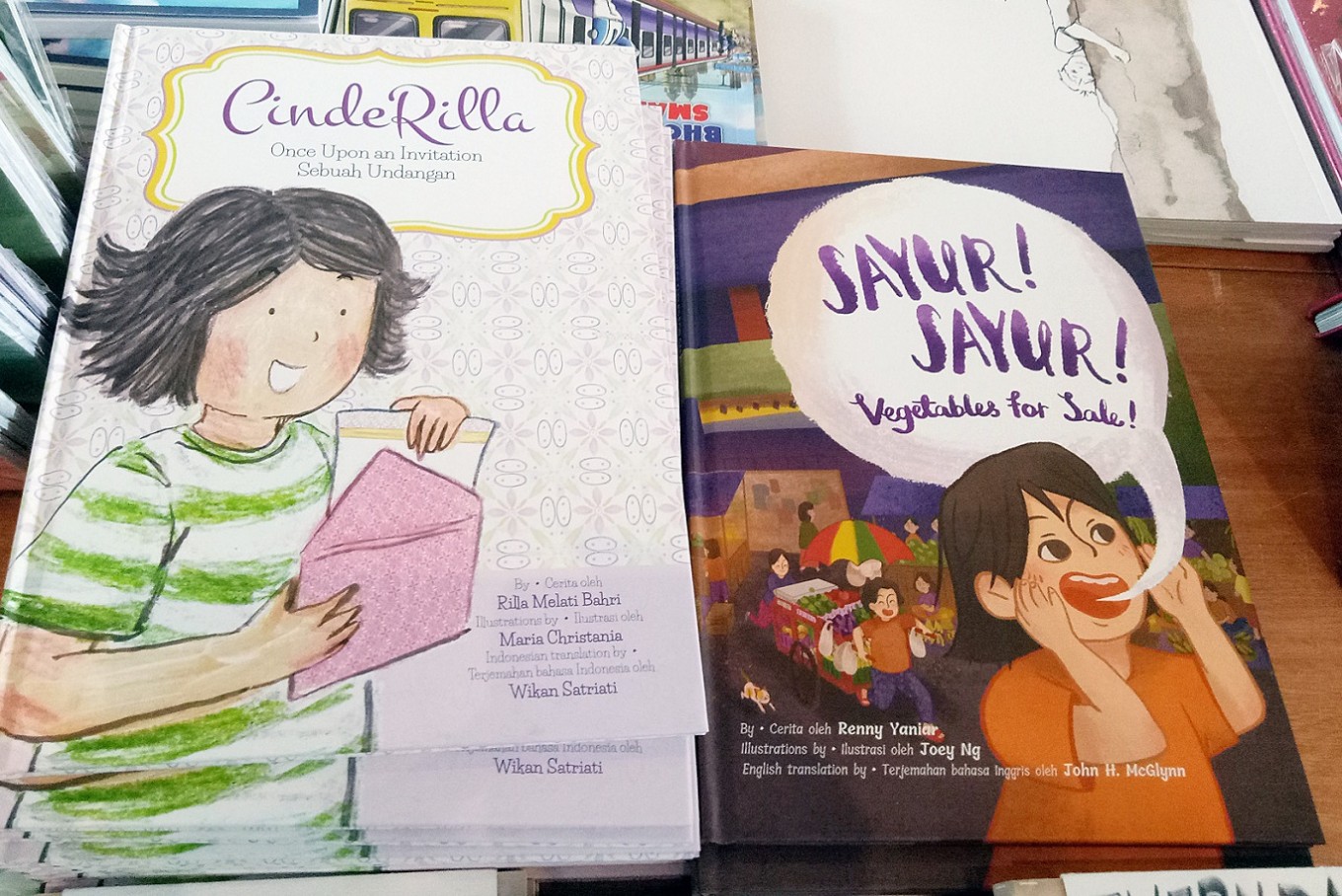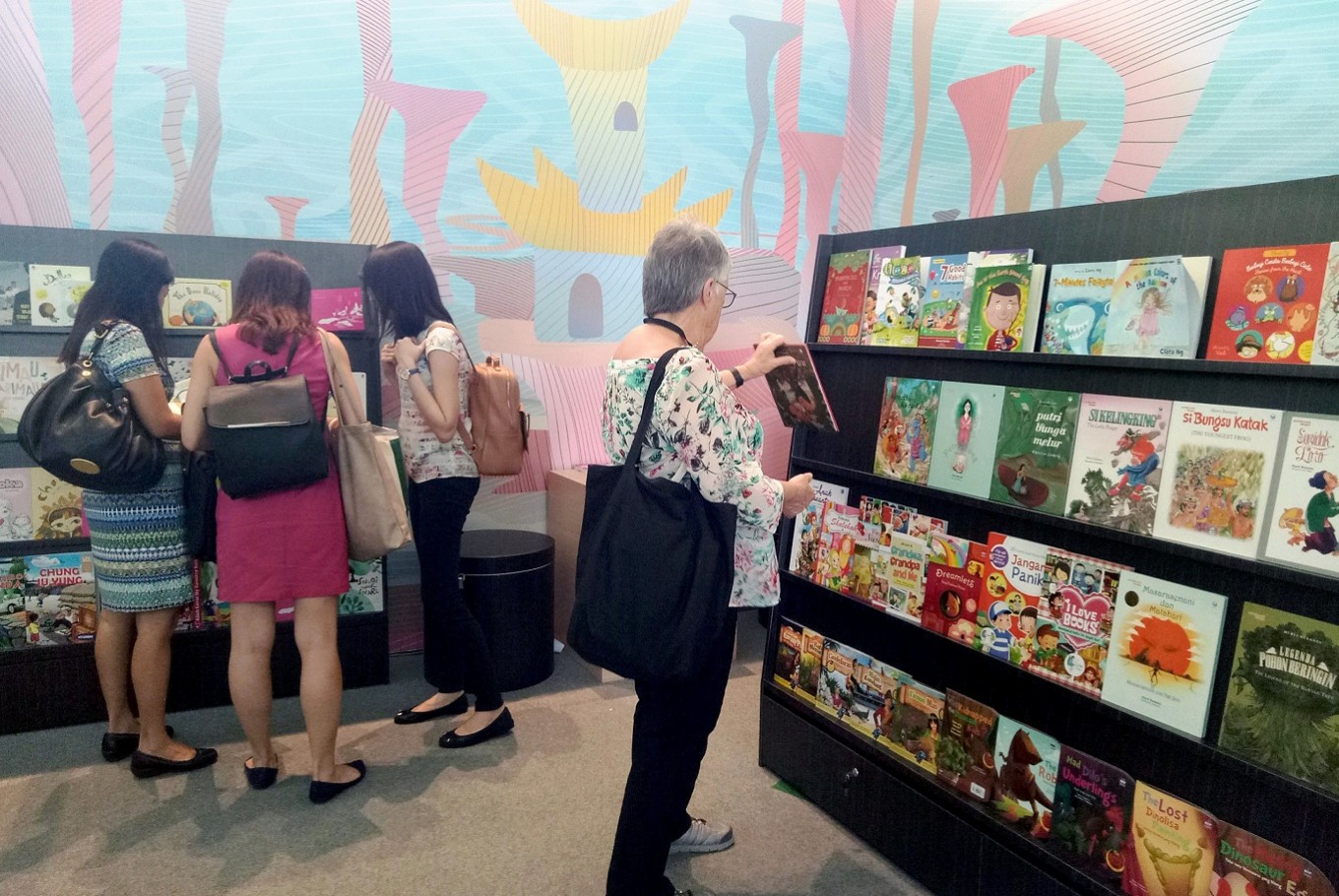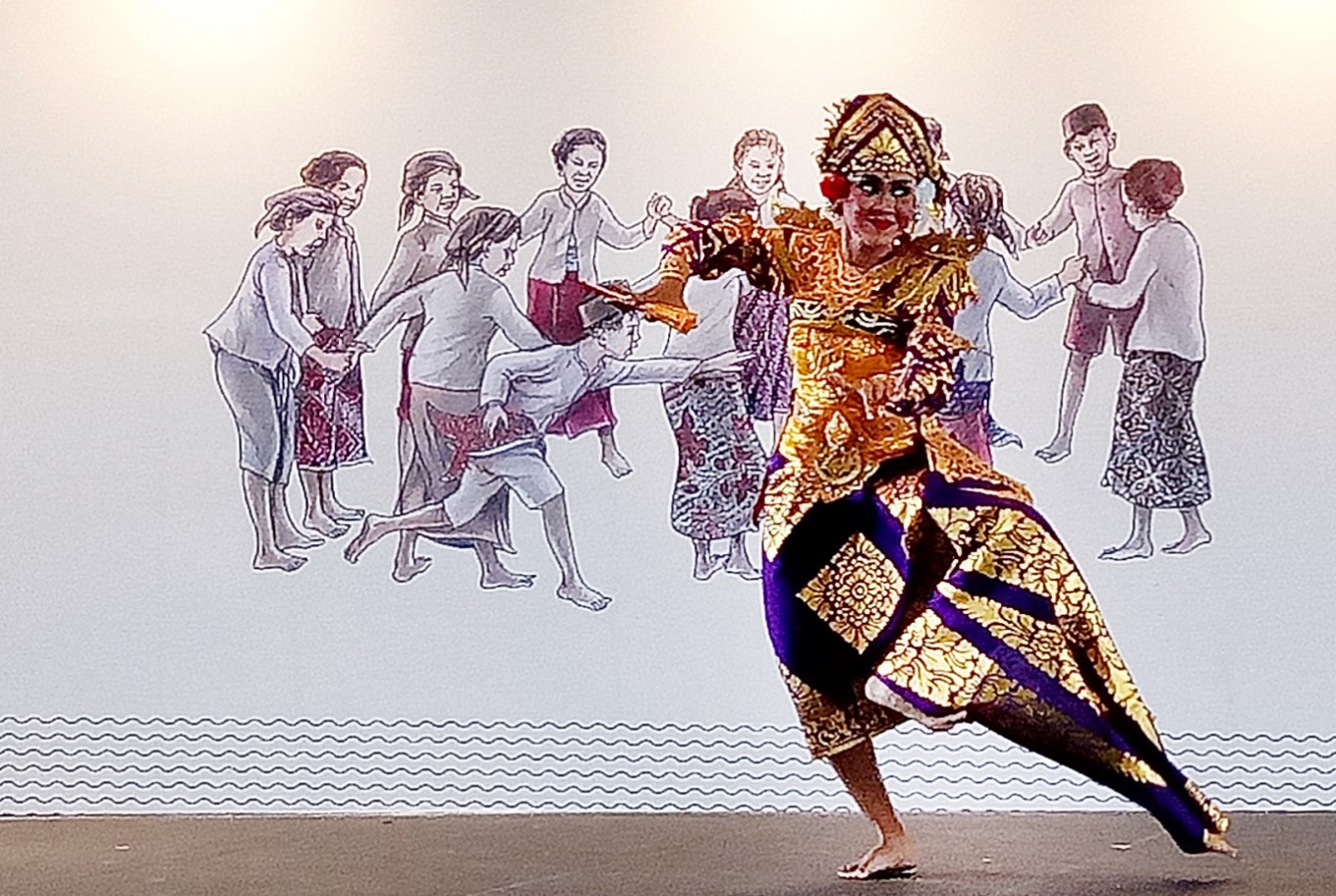Popular Reads
Top Results
Can't find what you're looking for?
View all search resultsPopular Reads
Top Results
Can't find what you're looking for?
View all search resultsIndonesian folktales grab global spotlight at AFCC
Indonesian delegates consisting of authors and performers are vying to promote local children’s content and folklore to neighboring countries as an effort to preserve them for future generations.
Change text size
Gift Premium Articles
to Anyone
 Collaboration: Two bilingual books (Indonesian and English) are put on display during their launch at the Asian Festival of Children's Content (AFCC) 2017 at the Singapore National Library. The books, Sayur! Sayur! and CindeRilla, were written and illustrated by Indonesian and Singaporean artists in a collaborative effort. (JP/Utami Diah Kusumawati)
Collaboration: Two bilingual books (Indonesian and English) are put on display during their launch at the Asian Festival of Children's Content (AFCC) 2017 at the Singapore National Library. The books, Sayur! Sayur! and CindeRilla, were written and illustrated by Indonesian and Singaporean artists in a collaborative effort. (JP/Utami Diah Kusumawati)
“A young girl, Pipinalo Suka, was sad. Her grandmother had disappeared in the forest. Pipinalo went looking for her grandmother and met a Batu Badaong, a big stone with plenty of leaves.
“She sang to the stone asking it to swallow her so that she could find her grandmother. However, she got stuck inside the big stone. With the help of a bird, Pipinalo ran away and went to a safe place.”
The story of Batu Badaong is a Maluku folktale performed by the Booyratan arts group at the Singapore National Library during the 2017 Asian Festival of Children’s Content (AFCC).
The group is one of the Indonesian representatives at the event.
An ethnomusicologist and a lecturer from Maluku, Christian Tamaela, founded the group to preserve Maluku traditional musical instruments and local folktales.
Read also: Three underrated Indonesian folktales that teach us a little more about life
“Batu Badaong is a story about living in harmony with other human beings as well as the environment and animals. I choose to present this folklore in Singapore to voice our hope of living in harmony,” Tamaela said after the performance, adding that he used Maluku traditional instruments such as the tipa, akapeti and klong one string to present Batu Badaong.
Tamaela said it was the first time the group had performed outside of Indonesia and at an international AFCC event.
In the future, Tamaela is planning to document several folktales from Maluku through a book.
The performance of Batu Badaong received applause from both AFCC participants as well as visitors of the National Library.
Srividhya Venkat, a storyteller from India, said she enjoyed the show because it transformed a folktale into a musical art performance that combine music, storytelling and theater.
 What do you see: Visitors browse through Indonesian children’s books at the AFCC’s Indonesian booth.(JP/Utami Diah Kusumawati)
What do you see: Visitors browse through Indonesian children’s books at the AFCC’s Indonesian booth.(JP/Utami Diah Kusumawati)
In addition to Batu Badaong, the Indonesian delegation, which consisted of 29 speakers and performers, provided workshops, conducted storytelling sessions and delivered presentations during the 2017 AFCC.
The delegation also opened a booth that displayed 200 children’s book titles from 18 Indonesian publishers listed under the Indonesian Publishers Associations (IKAPI).
Read also: Study: Nearly 60 percent of children like reading for fun
Emilia Nazir from the Indonesian Section of International Board on Books for Young People (INNABBY) presented her new research project with author Galuh Larasati. Together, they had recited the folktale Ratu Lemut, or Queen Mosquito, at Gunung Sari village, in Gunung Kidul regency, Yogyakarta, and encouraged local children to get involved in the play about the origins of the buzzing sound of mosquitos.
Emilia said the traditional story could teach a valuable lesson to the younger generation as it emphasizes the importance of a democratic process within society.
The preservation of Indonesian folklores is important because it faces the threat of extinction, according to Emilia.
Oral folktale stories could not survive solely by memory, she added. Therefore, choosing the best medium to recite Indonesian folktales was essential in passing their values to the next generation.
This year, Indonesia was chosen as the country of focus at the AFCC.
R. Ramachandran, executive director of the National Book Development Council of Singapore, said the country of focus was selected due to its rich culture, stories and folktales, especially related to children.
Indonesia, he explained, was home to a vast range of strong children stories. However, these tales are not widely known outside of Indonesia, even by its neighbors Malaysia and Singapore.
Ramachandran then pointed to the lack of English translations and promotion as the core problems hindering the development of Indonesian children’s stories.
 Opening act: Balinese traditional dancer and story teller Sri Ayu Pradnya Larasati performs the Palawakya dance during the opening of Indonesia Night at the Asian Festival of Children’s Content (AFCC).(JP/Utami Diah Kusumawati)
Opening act: Balinese traditional dancer and story teller Sri Ayu Pradnya Larasati performs the Palawakya dance during the opening of Indonesia Night at the Asian Festival of Children’s Content (AFCC).(JP/Utami Diah Kusumawati)
Meanwhile, Society for the Advancement of Children’s Literature (KPBA) president Murti Bunanta said Indonesia’s role as the AFCC’s country of focus will hopefully give the archipelago’s storytellers international recognition.
“We [Indonesia] have a lot of qualified [storytellers], but they are never heard,” she explained.
Read also: How to catch up with your reading goals
The participation of Indonesia at AFCC 2017 also signifies 50 years of bilateral ties between Indonesia and Singapore.
During this event, four Indonesian and Singaporean artists launched collaborative books titled Sayur! Sayur! and CindeRilla.
Ngurah Swajaya, the Indonesian Ambassador for Singapore, said these stories would allow children in both countries to share and understand each other’s culture, lifestyle and values.
“Through books like these, a better understanding and mutual interest among the people of Indonesia and Singapore can be established in order to create stronger people-to-people interaction, especially among the children of both countries,” he said.
Indonesia has also struck a deal to work with Malaysia in creating stories for children.
IKAPI’s head of Domestic Book Exhibition Program Melvi said a memorandum of understanding (MoU) was signed between IKAPI and Malaysia’s government-funded agency Perbadanan Kota Buku Malaysia during the event.
The MoU will result in collaborations between the two countries in several issues, including book exhibitions and development programs for writers.
This year’s AFCC also saw 50 business meetings take place between Indonesian delegates and seven publishers from four countries.










